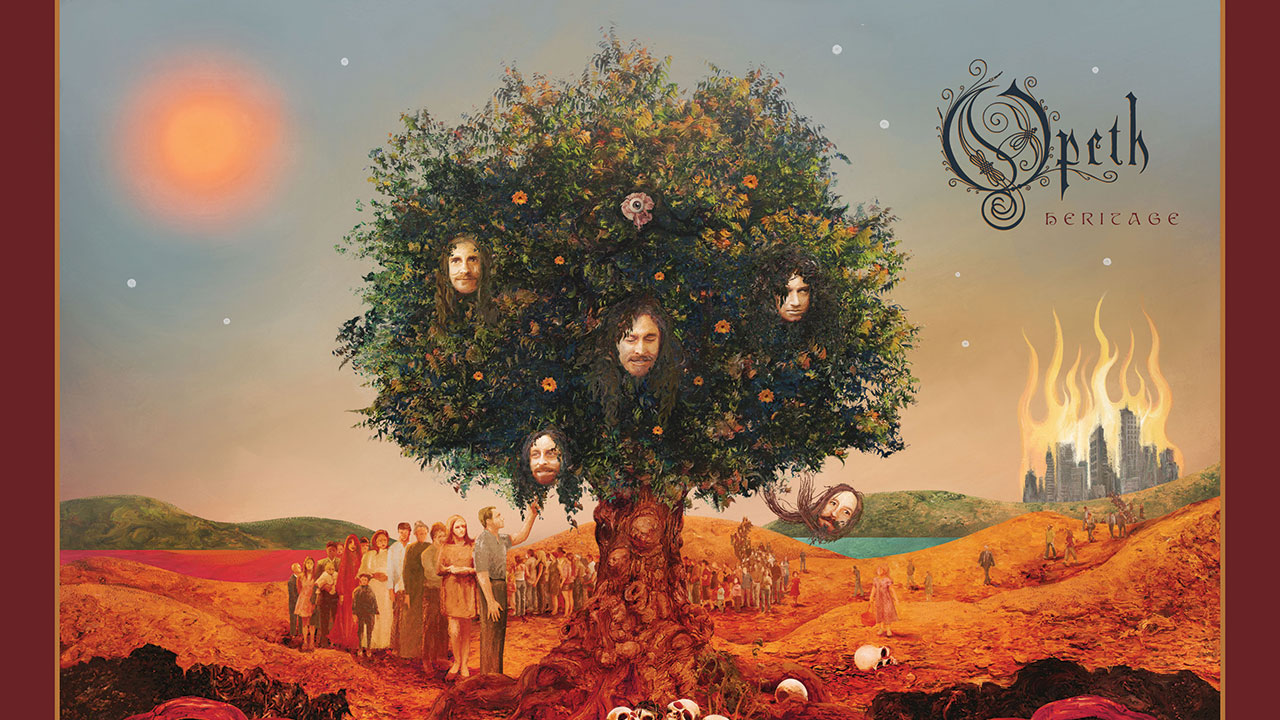I’m not certain,” Opeth frontman Mikael Åkerfeldt recently told this writer, “that had we not made this record the way it sounded, that there would have been another Opeth album!”
Profound stuff, but then no one’s going to deny that Heritage is an important album for Opeth. And surely there’s been no Opeth album that’s generated such debate and discussion as Heritage has thus far done. Prog had been given a heads-up by Steven Wilson, who mixed Heritage with Åkerfeldt, as to what we might expect sonically, but not having actually heard any music, even we were somewhat taken aback when the strident album artwork was released online back at the beginning of June. Admittedly, Travis Smith’s work on Heritage is a far cry from the gothic artistry that has embellished the band’s work in the past, and yes, its unashamed nod to all things 70s and progressive certainly seemed to convey a shift in Opeth’s sound. It was certainly enough to set the internet buzzing with paranoid metalheads and eager prog fans waffling on in equal measures.
Indeed, the furore seemed such, that when Prog and a few other rock magazines were treated to a first listening at an East London studios in July, sat gingerly sipping red wine and eagerly listening as Heritage began to emanate from the speakers, one young writer breathed an audible sigh of relief and uttered “Oh, there are guitars on the album then!”
True, while Heritage is festooned with all manner of wonderful guitar work from Åkerfeldt and Fredrik Åkesson, it’s still quite a step away from the kind of prog metal that the band were indulging in on Blackwater Park or Ghost Reveries. Gone too are any remaining death metal growls from Åkerfeldt in the vocal department, the like of which seemed to have split the prog audience in the past. In its place, and despite Åkerfeldt’s self-deprecation on the matter, is an assured and impressive vocal showing that is clearly one of Heritage’s highlights.
But the real highlight is the music. This despite the fact that Opeth have been moving in the direction of Heritage for years – 2002’s Damnation is perhaps it’s closest relative to it in the Opeth canon, although it does, over-all, come across like a natural progression from the 2008’s excellent Watershed. Here, though, on Heritage the band truly cut loose.
Bookended with the delicate keyboard-led title track (the first appearance from new keyboard player Joakim Svalberg) and the haunting closing Marrow Of The Earth, Heritage is an astonishing musical ride. If you were to marry the sound of MKIII era Deep Purple and Camel, two of Åkerfeldt’s undoubted heroes, then perhaps you can understand the ebb and flow of Heritage. None more so than on the hard rock groove of Slither, the band’s tribute to the late Ronnie James Dio, on which Åkesson whips up a veritable Blackmore-esque storm on guitar.
Yet if that’s the heaviest Opeth get on Heritage, the depth of material elsewhere will leave prog fans salivating. The Devil’s Orchard, already aired online, is a heady brew of 70s style hard rock with defiantly progressive time changes. Nepenthe ups the ante even further, blowing things out the water in a blaze of jazz fusion theatrics (augmented by Weather Report drummer Alex Acuña on percussion), showcasing just how good a drummer Martin Axenrot is, freed from playing a specific metallic style. Nepanthe itself gives way to the more intricate Häxprocess, which along with the folkier The Lines In My Hand allows the band time and space to showcase a musicality that those previously dissuaded by Opeth’s inherent heaviness can only applaud.
Not everything works so well. Sandwiched in-between the impressive sonics of The Devil’s Orchard and the drive of Slither, I Feel The Dark’s more sombre tones seem lost. And although it eventually builds into an impressive piece, Famine seems to take too long to get going and offers myriad shifting melodies and time changes. That said, the excellent Folklore, which leads into the closing lilt of Marrow Of The Earth is possibly one of the finest things Opeth have ever committed to disc.
True, it might be only natural that a magazine such as Prog heralds Opeth’s total shift into the realm of all things progressive as a success. But as a writer who has long admired the band’s sound, and a prog fan who wasn’t in the least bit troubled by the heavier end of their oeuvre, Heritage presents the band in a new and impressive light. It’ll be fascinating to see where Åkerfeldt takes it from here.
Buy from Amazon.

